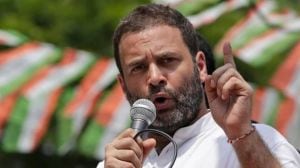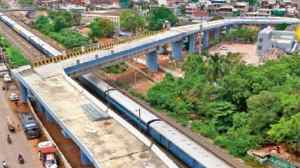Kyrgyz House okays Akayev resignation
Kyrgyzstan’s parliament accepted ousted President Askar Akayev’s resignation on Monday and called an election for July 10 in a mov...

Kyrgyzstan’s parliament accepted ousted President Askar Akayev’s resignation on Monday and called an election for July 10 in a move to shore up stability in the impoverished Central Asian state.
Akayev, who had ruled the mountainous, mostly Muslim nation of five million for almost 15 years, fled last month when thousands of protesters angered by a flawed parliamentary poll ransacked his offices and the Opposition seized power. Although he signed a resignation letter in Moscow last week, he remained technically in power until the parliament vote.
The likely two prominent candidates to become the ex-Soviet state’s next leader are acting President Kurmanbek Bakiyev, a former PM from the South of Kyrgyzstan, and Felix Kulov, a former security services Chief from the North.
But there have been fears that a race between one Oppositionleader representing the North and the other the poorer South could prove divisive in a state which saw ethnic clashes in the early 1990s.
‘‘The presidential election is a complicated problem for me,’’ Kulov told reporters after Monday’s ruling. ‘‘In order that my decision does not have any undesirable consequences it is necessary to carefully talk it over with Kurmanbek Saliyevich (Bakiyev). After that I’ll take a decision (on whether to run),’’ he said.
In parliament, 38 deputies — the smallest possible majority in the 75-seat house — voted to accept Akayev’s resignation. The legislature is a controversial body after the poll, held in two rounds in February and March, which the Opposition accused Akayev of using to stuff the house with his cronies.
Some candidates have not taken up their seats, including Akayev’s son and daughter who also fled the country, and it failed for four days last week to accept Akayev’s resignation.
The Organisation for Security and Cooperation in Europe, which criticised the parliamentary poll, welcomed the vote to accept Akayev’s resignation and the SC ruling clearing Kulov’s name. ‘‘Taken together, these decisions are an essential contribution to improving stability in the country,’’ Alojz Peterle, an OSCE envoy to Kyrgyzstan, said.
The protests that eventually unseated Akayev grew out of small demonstrations in constituencies around the country where candidates said the government was rigging the vote against them.
In a sign of ongoing tensions, a group of about 500 people gathered outside government offices on Monday evening to protest against a repeat election due to be held in the northwestern Talas region after legal challenges by a losing candidate. —Reuters
Supreme Court reverses Kulov conviction
BISHKEK: Kyrgyzstan’s Supreme Court on Monday oveturned Opposition leader Felix Kulov’s corruption conviction, removing the last hurdle he faced in his bid for the Presidency, his aide said. Kulov, a former Vice-President and Security Chief, spent more than four years in prison for corruption and other charges that he says were politically motivated. The charges were launched ahead of the 2000 Presidential election, barring Kulov from a race against ousted President Askar Akayev.
Kulov was freed from prison on March 24 after protesters stormed Akayev’s office and forced Kyrgzstan’s longtime leader to flee the country. Last week the SC overtured a ruling convicting Kulov of abuse of office. Today, the country’s highest court quashed another ruling against Kulov that convicted him of embezzlement. The court’s decision erases Kulov’s criminal record, allowing him to run in the Presidential elections, said his aide Rulan Chynybayev. —PTI
Photos




- 01
- 02
- 03
- 04
- 05



























